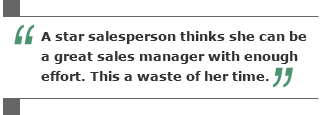Overcoming deficits is an essential part of the fabric of our culture. Our books, movies, and folklore are filled with stories of the underdog who beats one-in-a-million odds. And this leads us to celebrate those who triumph over their lack of natural ability even more than we recognize those who capitalize on their innate talents. As a result, millions of people see these heroes as being the epitome of the American Dream and set their sights on conquering major challenges. Unfortunately, this is taking the path of most resistance.
A misguided maxim?
"You can be anything you want to be, if you just try hard enough."
Like most people, I embraced this maxim at a young age. Along with thousands of other kids, I spent a good chunk of my childhood trying to be the next Michael Jordan. Every day, I practiced shooting hoops for three to four hours. I went to basketball camps each summer and tried in every way possible to be a great player. No matter how hard I worked at it, though, becoming an NBA star simply wasn't in the cards for me. After giving 100% of my effort for more than five years, I couldn't even make the junior varsity team.
Embracing the "You-can-be-anything-you-want to-be" maxim isn't something we outgrow. Similar scenarios play out in the workplace every day. A star salesperson thinks she can be a great sales manager with enough effort. She interviews other managers to gain insight, reads every book on management she can find, and stays late every night trying to get the job done -- at the expense of her family and even her health. Then, a few years into the job, she realizes that she doesn't have the natural talent to develop other people. Not only is this a waste of her time, but chances are, she could have increased her contribution even more if she had stayed in the sales role -- a role in which she naturally excelled. Yet if we want additional income, status, or responsibility, most organizational hierarchies force us into a very different role -- instead of allowing for an entire career of progression within a specific role that fits our talents.
 |
What's even more disheartening is the way our fixation on deficits affects young people in the home and classroom. In every culture we have studied, the overwhelming majority of parents (77% in the United States) think that a student's lowest grades deserve the most time and attention. Parents and teachers reward excellence with apathy instead of investing more time in the areas where a child has the most potential for greatness.
The reality is that a person who has always struggled with numbers is unlikely to be a great accountant or statistician. And the person without much natural empathy will never be able to comfort an agitated customer in the warm and sincere way that the great empathizers can. Even the legendary Michael Jordan, who embodied the power of raw talent on a basketball court, could not become, well, the "Michael Jordan" of golf or baseball, no matter how hard he tried.
This might sound like a heretical point of view, especially for those of us who grew up believing the essential American myth that we could become anything we wanted. Yet it's clear from Â鶹´«Ã½AV's research that each person has greater potential for success in specific areas, and the key to human development is building on who you already are.
The following real-life example from Â鶹´«Ã½AV's economic development work in Puebla, Mexico, provides a basic yet powerful illustration of what can happen when people focus on their natural talents.
Hector had always been known as a great shoemaker. In fact, customers from such far-off places as France claimed that Hector made the best shoes in the world. Yet for years, he had been frustrated with his small shoemaking business. Although Hector knew he was capable of making hundreds of shoes per week, he was averaging just 30 pairs. When a friend asked him why, Hector explained that while he was great at producing shoes, he was a poor salesman -- and terrible when it came to collecting payments. Yet he spent most of his time working in these areas of weakness.
So, Hector's friend introduced him to Sergio, a natural salesman and marketer. Just as Hector was known for his craftsmanship, Sergio could close deals and sell. Given the way their strengths complemented one another, Hector and Sergio decided to work together. A year later, this strengths-based duo was producing, selling, and collecting payment for more than 100 pairs of shoes per week -- a more than threefold increase.
While this story may seem simplistic, in many cases, aligning yourself with the right task can be this easy. When we're able to put most of our energy into developing our natural talents, extraordinary room for growth exists. So, a revision to the "You-can-be-anything-you-want-to-be" maxim might be more accurate:
You cannot be anything you want to be -- but you can be a lot more of who you already are.